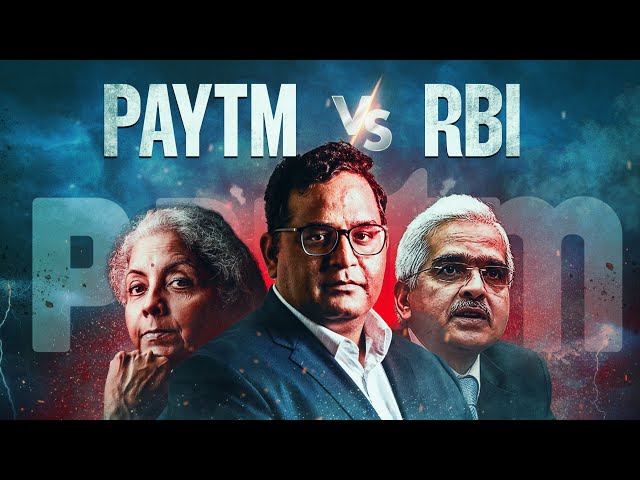Context:
The recent actions taken by the Reserve Bank of India (RBI) against Paytm Payments Bank Ltd (PPBL) have sent shockwaves through the fintech industry. The apex banking regulator's decision to bar PPBL from accepting further deposits and top-ups, citing persistent non-compliances and supervisory concerns, has raised questions about the future of Paytm's services and its compliance with regulatory standards. This move comes after an audit report highlighted various irregularities within the bank, signaling a significant setback for one of India's leading digital payment platforms.

RBI's Instructions and Impact on Paytm's Services:
The RBI's directives to PPBL have far-reaching implications for Paytm's operations. Effective February 29, PPBL is prohibited from accepting additional deposits, top-ups, or credit transactions into its wallets and accounts. This restriction extends to its prepaid instruments, including FASTags and National Common Mobility Cards (NCMC) cards. While existing customers can still utilize their balances, PPBL is barred from conducting various banking services such as AEPS, IMPS, bill payments, and UPI transactions. Additionally, the directive to terminate nodal accounts associated with Paytm's parent company and its payment services arm further complicates the situation.
These restrictions severely limit Paytm's ability to retain customers within its ecosystem and offer a wide range of payment and loan products. Macquire Capital analysts anticipate adverse effects on Paytm's revenue and profitability in the medium to long term, with estimates suggesting a potential impact of ₹300 to ₹500 crore on annual EBITDA. Furthermore, the regulator's actions raise concerns about the viability of Paytm's prepaid instrument license, hinting at broader challenges for the company in navigating regulatory compliance.
Paytm's Transition Plan and Challenges:
In response to the RBI's directives, Paytm announced plans to transition its services away from PPBL and collaborate with other banks. The company aims to expand its partnerships with third-party banks for merchant acquiring services, a critical aspect of facilitating payments for merchants. This transition process is expected to unfold in three stages, starting with the identification of partner banks willing to integrate with Paytm's ecosystem. However, the time constraints pose a significant challenge, considering the complexities involved in migrating accounts and ensuring seamless operations.
The alternative option of a one-time migration presents its own set of challenges, including the need to swiftly assess the commercial viability of potential partner banks. Paytm's President and COO, Bhavesh Gupta, acknowledges the urgency of the situation and emphasizes the importance of finding suitable banking partners to ensure continuity of services. Nonetheless, the transition process remains fraught with uncertainties, requiring meticulous planning and execution to mitigate disruptions for Paytm's vast customer base.
Regulatory Concerns and Compliance Issues:
The RBI's actions against PPBL highlight broader concerns regarding regulatory compliance and governance within Paytm's ecosystem. While Paytm insists on PPBL's independent management and adherence to banking regulations, questions linger about the company's governance structure and related party transactions. Notably, Paytm holds a significant stake in PPBL, raising concerns about undue influence on the subsidiary's operations.
Governor Shaktikanta Das's remarks regarding "effective action" against non-compliant entities underscore the seriousness of regulatory oversight in India's financial sector. Paytm's recent penalties for flouting KYC norms and concerns about money laundering further exacerbate regulatory scrutiny. Reports of multiple accounts linked to the same PAN number raise alarms about potential illicit activities, prompting investigations by regulatory authorities. The implications of these compliance issues extend beyond regulatory penalties, affecting investor confidence and future partnerships for Paytm.
Conclusion:
In conclusion, the RBI's actions against PPBL have thrust Paytm into a challenging period of regulatory scrutiny and operational upheaval. The company's efforts to transition its services to alternative banking partners reflect the urgency of addressing regulatory concerns and ensuring business continuity. However, the path forward remains uncertain, with regulatory compliance and governance issues casting a shadow over Paytm's future prospects. As the fintech industry grapples with evolving regulatory frameworks, Paytm faces formidable challenges in restoring trust, navigating compliance requirements, and safeguarding its position in India's digital payments landscape.
|
Probable Questions for UPSC Mains Exam Analyze the implications of the Reserve Bank of India's actions against Paytm Payments Bank Ltd (PPBL) for India's digital payment ecosystem. Discuss the potential long-term effects on consumer trust, regulatory compliance, and the competitiveness of the fintech industry. (10 marks, 150 words) Critically examine the governance and compliance issues highlighted by the RBI's directives to PPBL. Evaluate the impact of these concerns on Paytm's strategic partnerships, investor confidence, and future growth prospects in the Indian market. (15 marks, 250 words) |
Source – The Hindu








